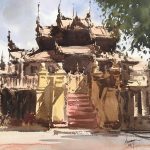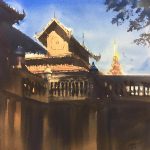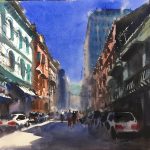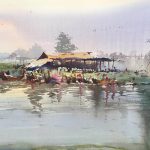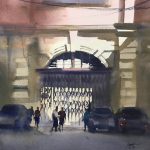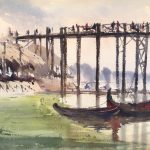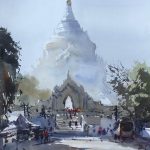The Irrawaddy Magazine |
- Four Border Police Missing in Rakhine State Boating Accident
- Satirist Feels ‘Restraint’ After Recent Arrest
- H1N1 Flu Outbreak in Myanmar Linked to One Death
- ‘The NLD Can’t Restrict Me Now’
- Flood Victims Rise to More Than 1,000 in Irrawaddy Region
- Top Mon Politician Resigns as Merger Hopes Stumble
- US Presses Myanmar to Cease Military Ties With North Korea
- Two Hearts of Myanmar: A Landscape Artist’s Perspective
| Four Border Police Missing in Rakhine State Boating Accident Posted: 24 Jul 2017 08:49 AM PDT RANGOON – A border police major from northern Rakhine State's Maungdaw Township confirmed to The Irrawaddy under the condition of anonymity that four policemen went missing after a schooner capsized in a local river early Sunday evening. The officers were returning from clearance operations in the Tin May village tract of neighboring Buthidaung Township. "Security forces have discovered the vessel but have not found the bodies yet," he said. According to the police major, the missing policemen were from Taungbazar border police station. The Irrawaddy obtained a police report on the incident on Monday, stating that a police major named Ye Zaw Htut had led one dozen policemen to the Kyaung Taung border police station as reinforcements. Another 19-man team led by another police major, Nay Lin Htet had joined Maj Ye Zaw Htut as they received a tip-off concerning militant activities near the Tin May region on Sunday. The Maj Ye Zaw Htut-led security team traveled along local waterways to return to the Kyaung Taung border police station on three schooners after "clearing territory" in Tin May village. But the vessel which carried Maj Ye Zaw Htut and six officers unexpectedly overturned when it encountered a strong current. Maj Ye Zaw Htut, Cpl Khin Maung Than, LCpl Ko Ko Aung and Tun Lin Htike were still missing as of Monday evening. According to local media reports, three other policemen and the schooner driver, identified simply as a man named Mustafa, had survived the incident. The police report stated that police discovered the empty vessel near the shore of Kyaun Pauk. In it were two assault rifles and four magazines with two hundred rounds of bullets, but no one remained on board. The border police called in reinforcements to search for the passengers. The report did not elaborate on whether the vessel had life jackets on board, or if the boat was owned privately or by the government. Rakhine State's transportation system is dominated by ferries, speedboats, and shipping routes but operators are notorious for not applying safety measures, including provisions of life vests, and a number of people have killed in the region in tragic boating accidents. On March 13, 2015, the government-owned Aung Ta Kon (3) ship, running between Sittwe and Kyaukphyu, sank near the Naungdawgyi Sea in Myebon Township. The boat was overloaded with various goods and around 300 passengers. According to local publications, at least 160 people died; only 72 dead bodies were discovered. The post Four Border Police Missing in Rakhine State Boating Accident appeared first on The Irrawaddy. |
| Satirist Feels ‘Restraint’ After Recent Arrest Posted: 24 Jul 2017 07:00 AM PDT YANGON — Until last month, columnist Ko Kyaw Zwa Naing—also known by his pen name "British Ko Ko Maung"—enjoyed press freedom to some extent in his satirical writings. His articles questioned the Parliament, Union-level organizations' performance and criticized the policies of regional governments, and he spoke out on the suffering caused by the country's long civil wars. But on June 2, the writer was arrested and charged under the controversial Article 66(d) of the Telecommunications Law—which concerns online defamation—after a Myanmar Army official complained that one of his satirical pieces harmed the military's dignity. The piece titled "Kyi Htaung Su Thitsar" in Burmese, meaning "Oath Made in a Nation of Bullets" questioned the country's armed struggle and peace process. It was published on March 26, coinciding with the army-produced film "Union Oath," which commemorated the country's 72nd Armed Forces Day. U Kyaw Min Swe, the chief editor of the newspaper The Voice Daily—which published the article—was also arrested and charged with Ko Kyaw Zwa Naing, and remains in detention. Despite being acquitted on the charges under Article 66(d) after two weeks of detention, the military brought another lawsuit against both Ko Kyaw Zwa Naing and U Kyaw Min Swe, resulting in the pair being charged under Article 25(b) of the Media Law. Ko Kyaw Zwa Naing said he was still reeling from the first arrest, particularly in seeing his family suffer as a result. In this recent interview with The Irrawaddy, he spoke about his feelings following his release, and the impact that the experience has had on his writing. You have been arrested and charged over a satirical article. What you would like to say, concerning this? I wrote in line with the technique of satire. It did not name specific institutions, groups, or the army, but generically satirized the situation of country's long civil wars. But the military complained, saying that it harmed their dignity. I don't want to comment on the charge under the Media Law, but using the undemocratic Article 66(d) of the Telecommunications Law against the media is unacceptable. We have the enacted the Media Law and if anyone has a complaint against an article published in the media, the charges should be brought forward with the Media Law. I was arrested for 14 days even before the court accepted the case. I was released later, with the court's ruling, after the Ministry for Transport and Communications remarked that the online defamation charge was not fit to prosecute me with, as I wrote for a newspaper. But I lost my child. My wife who was two months pregnant, miscarried because of the anxiety she went through for me… running to the prison, the police station and the court. Who will compensate for that? Did you expect the arrest and lawsuit over your article? Indeed, we satirists are writing at the risk of imprisonment. In the past, we satirized very indirectly, but in these days, our satire is not as indirect, so as to be more understandable to the readers, but not crossing the line. For the article "Kyi Htuang Su Thitsar," I read it three times after I finished it. I did not care to accuse or defame anyone or any group. It only included the feelings of pain, hurt and loss caused by the civil wars. I have a clear conscience about the article. That's why I was surprised when I was arrested over it. When did you start writing satire? Since 2012, under the pen name "British Ko Ko Maung" and sending [articles] regularly to The Voice, Myanmar Post and many other publications. Are you still writing satire since your release? Yes. Are publications to which you regularly sent your articles still accepting them in the way they did before? They ask me for articles. But some publications have requested that I not criticize China or the military. But as a satirist, it is not all right to write under [such] controls. If it is not okay with me, I don't send to them. That's it. How about satirizing the peace process or the military? I satirize not only the military but also the current issues. I write as if I am viewing the issues. But now, it feels like, "rein it in…bring it to a halt" [laughing]. But if the issue comes up to write about, I will do it. Let's ask frankly: knowingly or unknowingly, are you self-censoring in your writing? I have to think about the consequences. I can't just simply do what I believe. My wife has suffered from this incident. And also Ko Kyaw Min Swe [the chief editor of The Voice Daily] is still detained even though I was released. His family has suffered from this too. It has not just hurt me but also the people around me, directly or indirectly. That thought has become a restraint to me. And that's what I was afraid of—that it would also restrain other writers and media workers. It is not good for either press freedom or the country's democracy. The post Satirist Feels 'Restraint' After Recent Arrest appeared first on The Irrawaddy. |
| H1N1 Flu Outbreak in Myanmar Linked to One Death Posted: 24 Jul 2017 05:29 AM PDT NAYPYITAW — Thirteen people have contracted A (H1N1) influenza in Yangon and Chin State's Matupi Township, with one thought to have succumbed to the virus, according to the Ministry of Health and Sports. In Chin State, one of the 10 people diagnosed with H1N1 since early July has died. Two patients are receiving treatment for H1N1—often referred to as swine flu—in the intensive care unit of Yangon General Hospital. Another patient is receiving treatment for the disease at New Yangon Hospital, according to the deputy director-general of the Public Health Department, Dr. Than Htun Aung. "It is not swine flu or avian flu. It is a strong seasonal flu that affects humans. It can be cured with prevention and early treatment, but it is strong. Children and elderly persons will be vulnerable to this type of flu," Than Htun Aung told reporters in Naypyitaw. Health minister Dr. Myint Htwe and other ministry officials discussed short- and long-term plans to prevent the disease on Monday morning. "We'll inform hospitals how to carry out prevention work, and educate people through State media about the disease," said a health officer who attended the meeting. The ministry confirmed the outbreak as H1N1, saying that Myanmar saw 16 infections in 2009, 232 in 2010, 29 in 2012, 169 in 2013, three in 2015, and nine in 2016. No cases of infection were reported in 2011, said the ministry. The World Health Organization (WHO) declared H1N1 a pandemic in 2009 as it was spreading fast around the world. "This disease is called world human flu. It broke out as a pandemic in 2009, and it still persists in Myanmar. Now there are continuous rains, the weather is damp, and the disease easily spreads in populous areas. Though it is strong, fatality rates for the disease are low," said Than Htun Aung, who is also in charge of the pandemic and disaster resilience division under the ministry. The flu vaccine invented in the aftermath of the 2009 outbreak is unsafe, according to the ministry, which has not used it but instead focused on prevention. "People would go to private clinics in the case of infection, meaning there is a need for private clinics to report to us. If necessary, we have to do X-ray, blood, and saliva tests and administer medicines depending on the severity of the virus," said Than Htun Aung. H1N1 has broken out annually since 2009, he explained, but awareness and in turn fear of the disease has grown recently. The three patients in Yangon are recovering, he said, and urged people to exercise caution but not panic. H1N1 flu symptoms are the same as seasonal flu, including cough, fever, sore throat, stuffy or runny nose, body ache, headache, chills and fatigue. The health ministry has encouraged people to wear masks and wash their hands frequently, cover mouths when coughing and sneezing, and avoid crowded places. Translated from Burmese by Thet Ko Ko The post H1N1 Flu Outbreak in Myanmar Linked to One Death appeared first on The Irrawaddy. |
| ‘The NLD Can’t Restrict Me Now’ Posted: 24 Jul 2017 05:01 AM PDT U Sein Win, the National League for Democracy (NLD) lawmaker of Irrawaddy Region's Maubin Township, resigned from the party last week. The agriculturalist-turned-lawmaker had represented the township for the NLD since the 2012 by-election. Under the previous government, he served as the head of the Union Parliament's Committee for Confiscated Farmlands and Other Lands for the Irrawaddy Region. Under the current government, he was appointed as the chairman of the Farmers and Labor Affairs Committee of the Lower House, but was removed from the position last December for his alleged failure to follow NLD guidance. He recently talked to The Irrawaddy about the reasons behind his resignation, his removal from the parliamentary committee, and his future plans. Why did you resign from the NLD? I am restricted by the party's rules and regulations to go and meet farmers outside the township [Maubin]. Farmers have invited me, but I was not able to meet them. I want to meet and disseminate agricultural knowledge to farmers in any township independently without restraints. As you won the seat in the 2012 by-election, weren't you restricted in your communications with people outside your constituency around that time? Yes, I was. I was not allowed to give talks outside my constituency for almost six years. I don't know why they [restrict], but it disadvantages farmers as I am an agriculturalist. How did you submit your resignation? And what was the party's reply? Did they request that you stay? I submitted the resignation dated July 14 to the party headquarters, and the Union Election Commission (UEC) told me by phone on July 20 that they had received the [NLD's] letter informing them of my resignation. So, I confirmed my resignation. They didn't ask me not to resign. I presented all the reasons—about the difficulties I faced since the previous term—in my resignation letter, so they knew that they had nothing to say. Last year you sued four people including two NLD members in Maubin, according to local media, under fraud and defamation charges for allegedly distributing leaflets relating to farmers' affairs that bore your signature. Did the lawsuits impact your decision to resign? That time, I filed a complaint under criminal charges against the four at the police station, and the party asked me not to file the complaint. But I refused, saying that police and the judicial sector would decide whether it is an offense or not, but the party should not use its power to restrict it. Then the party removed me from the chairman position [of the farmers affairs committee], saying I didn't obey their guidance. I stepped down willingly. But if they are to remove a parliamentary committee chairman, there should be an internal investigation in Parliament to prove the chairman is not dutiful. I was appointed with the approval of all the MPs, but only the parliamentary speaker dismissed me. As the parliamentary speaker did this according to the instruction of the party, this means the Parliament is under the influence of the party. Now you are an independent lawmaker, what are your future plans? I can engage in the issues of farmers and laborers widely. They can't restrict me now. I am able to give talks [to farmers] beyond my constituency. It is suffice to say that the resignation has given me the opportunity to help and fulfill their wishes to the best of my ability. Some candidates contested the 2015 election using the image and strength of the party. Will you have full confidence contesting the 2020 election as an independent candidate? I'll engage in serving the interests of farmers as an independent candidate. I'll do what I should depending on their wishes and support. I mean, they will decide for me whether or not to contest the next election. Translated from Burmese by Thet Ko Ko The post 'The NLD Can't Restrict Me Now' appeared first on The Irrawaddy. |
| Flood Victims Rise to More Than 1,000 in Irrawaddy Region Posted: 24 Jul 2017 02:29 AM PDT PATHEIN, Irrawaddy Region — Heavy rains and floods have forced more than 1,000 people from their homes to relief camps in Danubyu, Myanaung, and Ingapu townships in Irrawaddy Region. "We have so far opened four relief camps, and victims mainly need food. We are prioritizing emergency food supplies in each township," said director of the Irrawaddy Region Relief and Resettlement Department U Than Soe. More than 60 households are taking shelter at a relief camp in Myanaung; more than 120 households are at two relief camps in Danubyu; and more than 100 households are at a relief camp in Ingapu Township. More than 60 schools have been closed across the region because of the floods. "There are 470 flood victims at the relief camps in Danubyu, mostly from villages and wards outside of the dike," regional lawmaker U San Htwe of Danubyu told The Irrawaddy. "The social welfare department has provided rice, and we've distributed it. The situation is not serious and the [township] flood rescue committee has prepared sand bags," he said. The water level of the Irrawaddy River is two feet above its danger level in Hinthada and Zalun townships, three feet above in Danubyu, and 2.6 feet above in Nyaungdon, according to the Department of Meteorology and Hydrology. The Irrawaddy Delta saw devastating flooding last year that affected more than 500,000 people in Maubin, Hinthada, Pathein, Pyapon and Myaungmya districts, and inundated more than 200,000 acres of paddy fields, according to statistics from the Irrawaddy regional government. Since July 18, nearly 5,000 people from four townships in Mon State have also been affected by flooding, according to the regional relief and resettlement department. In Rakhine State, roads and residential areas in Ann and Taungup townships were inundated with water up to five feet in some places as of Sunday. In Thandwe, three monasteries gave shelter to 360 people displaced by floods, while four quarters and a village nearby were inundated on Friday. Meteorologist U Tun Lwin has warned of possible upcoming torrential rains in Myanmar due to a strong monsoon in the Bay of Bengal. Rakhine State, Irrawaddy Region, Magwe, Yangon and Bago Regions are prone to flooding. Additional reporting by Hintharnee from Mon State and Moe Myint from Yangon. The post Flood Victims Rise to More Than 1,000 in Irrawaddy Region appeared first on The Irrawaddy. |
| Top Mon Politician Resigns as Merger Hopes Stumble Posted: 24 Jul 2017 01:53 AM PDT MOULMEIN — Dr. Aung Naing Oo, the deputy speaker of Mon State parliament, has resigned from the All Mon Region Democracy Party (AMDP) amid calls for a new regional organization. Aung Naing Oo announced that he had submitted his resignation letter to his party at a gathering of ethnic Mon parties in Mon State on Saturday, but declined to disclose the reason behind his leaving. "I have no plan to form a new political party with those who are expelled by the Mon parties. The two parties are just giving lip service about the merger, but nothing is happening in reality," he said at the meeting, referring to the proposed merger of his party and the Mon National Party (MNP). AMDP Joint Secretary 1 Nai San Tin said the party received and accepted his resignation in the second week of July. "We have nothing to say about it as he did it of his own volition," said Nai San Tin. Aung Naing Oo, who was serving as the secretary of Chaungzon Township AMDP chapter, contested and won the bid to represent Chaungzon in the 2010 and 2015 general elections. He supports the idea of merging the AMDP and MNP, and, as a member of a group of independent Mon politicians, polls the public on their thoughts regarding a new Mon political party. The group also explains Mon State's current political developments to locals. On July 13-15, the MNP held a central executive committee (CEC) meeting which saw the expulsion of two CEC members and four central committee members including Dr. Min Soe Lin, who won the seat for Ye Township in the 2015 general election. Joint secretary 1 Nai Soe Myint of the party told The Irrawaddy that Min Soe Lin was dismissed because of his lengthy absence from party meetings, although Min Soe Lin believes his dismissal was because of the potential merger. "I was expelled because I actively support the merging of the two parties," he told The Irrawaddy. The two parties confirmed to The Irrawaddy that they had chosen representatives to hold discussions on the merger—an idea that was first presented around 2013, but has been continuously stalled by struggles to find common ground on the terms of a coalition. In the 2015 election, the National League for Democracy (NLD) won the majority of votes in the state, which many Mon blamed on votes being split between the two Mon parties. In January, about 300 Mon youth in Lamine sub-township in Ye protested against the leaders of the AMDP and MNP after they refused to combine their parties. Growing calls to form a new Mon political party followed the protest. Citing local opinion polls, former member of the New Mon State Party committee Nai Ta La Nyi said about 60 percent of Mon locals support the idea of a fresh political outfit. Translated from Burmese by Thet Ko Ko. The post Top Mon Politician Resigns as Merger Hopes Stumble appeared first on The Irrawaddy. |
| US Presses Myanmar to Cease Military Ties With North Korea Posted: 23 Jul 2017 11:06 PM PDT WASHINGTON — Myanmar's military has maintained ties with North Korea, even though the civilian-led government denies any cooperation, and the Trump administration is pressing for a complete break-off of remaining links, current and former US officials said. Washington made its case to Myanmar's de facto leader, Nobel Peace Prize laureate Aung San Suu Kyi and the army chief Snr-Gen Min Aung Hlaing during a visit to the country this week by the US special envoy for North Korea. US Ambassador Joseph Yun's trip to Myanmar underlined continuing US worries over North Korean links that date back to Myanmar's decades of military rule, according to a senior State Department official on Friday. "It was an opportunity to message that any engagement with North Korea, particularly military engagement, is counterproductive to trying to end this threat that North Korea poses to the region and to the globe," the official told Reuters, speaking on condition of anonymity. He declined to specify what kind of military cooperation had continued between North Korea and Myanmar. There was no immediate response to a request for comment from Myanmar's embassy in Washington. The official said US sanctions leveled this year against the Myanmar Army's procurement body were meant to "reflect long-standing concerns" about the military's dealings with Pyongyang. Myanmar insists that arms deals and other military relations with North Korea stopped before Myanmar's transition to a nominally civilian government in 2011. Myanmar's military was believed in the past to have imported North Korean-made weapons and North Korean personnel also worked in Myanmar, two former US officials said. Any residual ties may be unfinished business between the two armies dating back to Myanmar's previous military-led government, one of the former officials said, adding there was no indication of a "nuclear component to the relationship." Relying on Diplomacy The State Department official did not rule out the possibility of imposing further North Korea-related measures on Myanmar, saying, "If a situation becomes so egregious and serious for our national security interests, there are a variety of tools, including sanctions." For now, though, Washington was relying mostly on diplomacy with Myanmar, a resource-rich and strategically placed country that Washington wants to keep out of China's orbit. He stressed, however, that it would be difficult to proceed toward full normalization of US relations with Myanmar until Washington was convinced of a halt to ties with North Korea. Yun's trip followed North Korea's test on July 4 of an intercontinental ballistic missile that Pyongyang says can carry a large nuclear warhead, and which experts believe can reach Alaska. As Yun arrived in Yangon for talks on Monday, Kyaw Zeya, permanent secretary at Myanmar's Ministry of Foreign Affairs, insisted Myanmar no longer had military ties with Pyongyang and was complying with UN resolutions banning such links. "It's normal relations between the two countries," he told reporters. "As I understand, there's no such relations between military to military. Definitely not." The State Department official told Reuters that Myanmar authorities did not explicitly deny that some vestiges of the previous North Korea relationship remained but said "those ties are not what they were in the past." Myanmar's former ruling junta, which, like North Korea, was widely shunned by the outside world over its suppression of human rights, was known to have ties to Pyongyang. This included sending missile experts and material for arms production to Myanmar. Myanmar's Directorate of Defence Industries (DDI) was sanctioned in March under the Iran, North Korea, and Syria Nonproliferation Act. The DDI was previously sanctioned in 2012 and accused of materially assisting North Korea but had fallen off the sanctions list in October after the Obama administration dropped most measures against Myanmar in recognition of a successful political transition. The post US Presses Myanmar to Cease Military Ties With North Korea appeared first on The Irrawaddy. |
| Two Hearts of Myanmar: A Landscape Artist’s Perspective Posted: 23 Jul 2017 10:30 PM PDT YANGON — Pantanaw is a small rice-growing township in Irrawaddy Division, but it is significant in Myanmar's history for turning out two prominent figures worldwide. U Thant (1909-1974), the third Secretary General of United Nations, and the only person from Myanmar to hold this position thus far, was born in this town. It was also the hometown of artist U Ba Nyan (1897-1945)—the first art student from Myanmar during the colonial era to learn in the Royal College of Art in London and the Yellow Door Fine Arts School. He played a key role in introducing Western techniques to Myanmar artists and is seen as an influential figure in the country's art history. Born in 1991 in the same township, Aung Htet Lwin grew up listening to the life stories of these two great men, and was deeply inspired by them. But later, it became clear that it was U Ba Nyan who had inspired him most. While he was working at a media company, Aung Htet Lwin took leave to exhibit his first solo art exhibition in Thailand in a rush in 2015. At that time, he was just 24. After this exhibition, his dream had become clearer, and then he quit his job to become a full-time artist. He has made his name as a landscape artist, immensely captivated by the scenes of the towns he saw across the country as he accompanied his civil-servant legal officer mother as she was transferred from place to place. Later, he found his artistic inspiration in the urban cityscapes of Yangon, leading to his second solo show, "Yangon Essay," at Lokanat Art Gallery in the historic capital in 2016. "As I went around Yangon, I was fascinated by its landscapes and gradually fell in love with them," said Aung Htet Lwin, who is now 26 years old. His third solo exhibition, "Illumination 31," showcased in Yangon earlier this year. He graduated from the National University of Arts and Culture, and the painting he created for graduation depicted the High Court in Yangon. He presented a thesis analyzing paintings by urban artists in order to get his post-graduate art diploma from the same university. For his fourth solo show, Aung Htet Lwin drew outdoors in Yangon, and also stayed in Mandalay for one month to do the same. Entitled "Two Hearts of Myanmar," the exhibition will take place at Cloud 31 Art Gallery on 31st Street in Yangon's Pabedan Township from July 23-27. The exhibition will feature 29 watercolor paintings depicting the landscapes, ancient buildings, and pagodas of Yangon and Mandalay, and are priced between US$100 and $300. There will also be landscape paintings of Sagaing and Mingun at the exhibition, he said. "I'm more than satisfied with drawing Mya Thein Tan Pagoda," said Aung Htet Lwin, referring to a famous Sagaing structure built in 1816 by King Bagyidaw. "I almost forgot everything else as the pagoda engrossed me," he said. Aung Htet Lwin attributed his career thus far to two things: his admiration for U Ba Nyan, and the first prize award that his work won at his graduation from the National University of Arts and Culture. "I began to know about Saya U Ba Nyan through school textbooks when I was a fifth-grade student, and I learned more about him as I studied the history of art at the university," he said. "He was already famous at the age of 25 in places like England. If I can't do as well as him, I paint with the attitude that I have to work as hard as him." Translated from Burmese by Thet Ko Ko The post Two Hearts of Myanmar: A Landscape Artist's Perspective appeared first on The Irrawaddy. |
| You are subscribed to email updates from The Irrawaddy. To stop receiving these emails, you may unsubscribe now. | Email delivery powered by Google |
| Google Inc., 1600 Amphitheatre Parkway, Mountain View, CA 94043, United States | |
